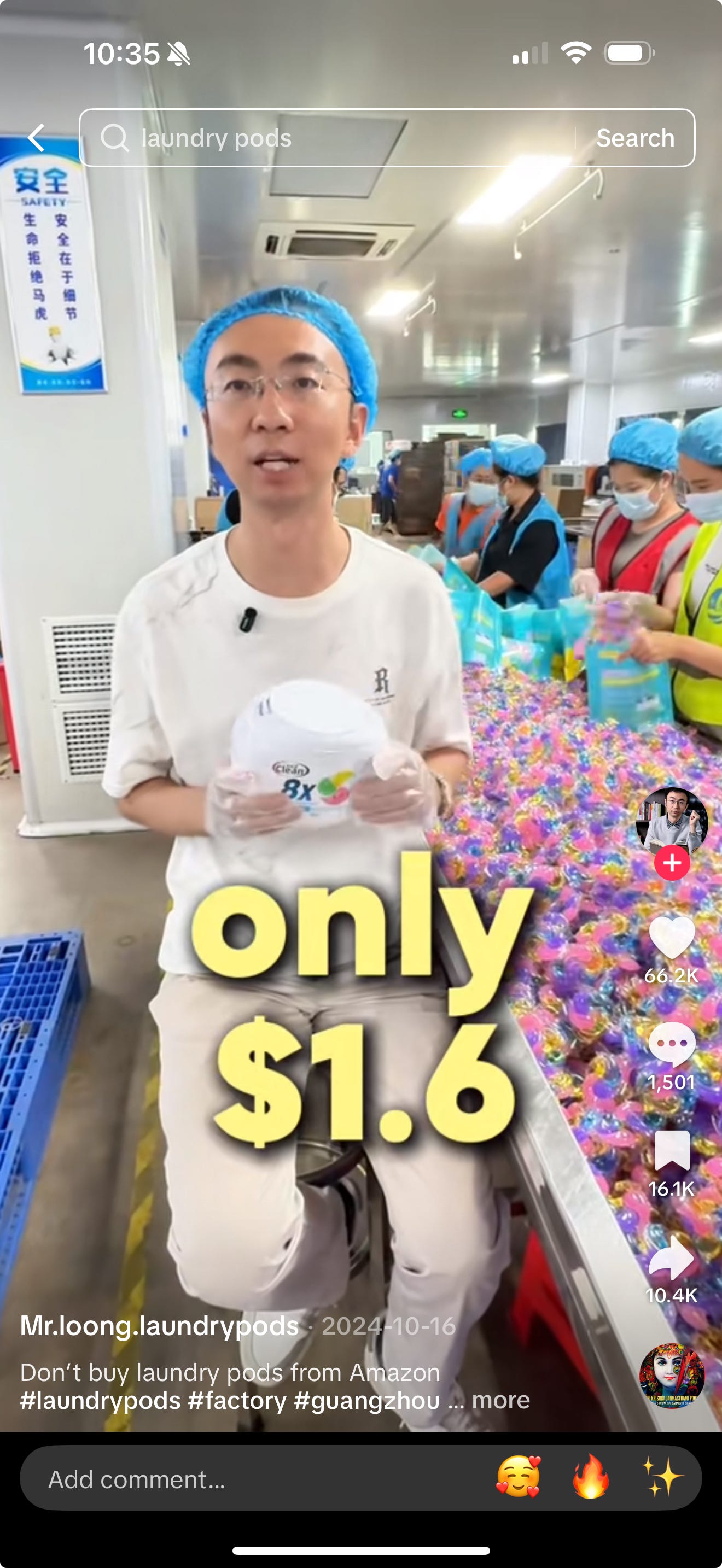In the Wake of a Tariff War, Chinese Manufacturers Clap Back on TikTok
For years, Chinese companies have quietly produced products for American brands to sell at huge markups. In the wake of Tump's tariff war, they're now going direct to consumers.
“Does Lululemon have an OEM factory in China?” starts a TikTok video from user ian furniture (OEM referring to original equipment manufacturer). “Of course, yes!” he says, before naming the apparel brand’s two suppliers in Yiwu City, a region in East China. He goes on to say that the cost of purchasing yoga pants from these facilities is $5-$10 per item. Meanwhile, Lululemon charges customers well over $100 for the same pair of pants.
Chinese suppliers are taking to TikTok to expose the suppliers and true cost behind American brands like Under Armour, Lululemon, Adidas, Nike, and more. And it’s not just clothing companies that are being outed.
“Laundry pods on Amazon cost $15, $20 or even $30 USD for a pack,” starts a TikTok video by mr.loong.laundrypods. “In Mr. Loong’s factory, they only cost $1.6 USD,” he says.
For years, Chinese companies have quietly produced products for American brands to sell at huge markups, but now, in the wake of an American tariff war that especially targets China, Chinese manufacturers are clapping back. Many of them are taking to TikTok—posting videos that expose the insane margins American consumers pay on almost everything. In the process, they’re also offering to do business directly with American consumers:
“We can ship to anywhere in the world starting from 1 carton,” says Mr. Loong. “Our product ships within 2 days” he adds.
We’ve traditionally thought of China as the middleman between brands and consumers: Brands design products, China manufactures them, and customers purchase them. But in the wake of Trump’s tariffs, China is playing a kind of Uno Reverse Card, showing how American brands are the intermediary, and that their country is ready and willing to do business directly with American consumers and cut out American brands in the process.
Even if American consumers have to pay tariffs on imported Chinese goods, it will still be cheaper than buying from brands that mark up prices by up to 90%.
In a video shared to TikTok by SEN BAGS, a factory owner holds up a brand new Kelly Bag. “Do you recognize this style? This bag? Of course you do” he says. He explains that for the past 30 years, his company has been the OEM factory for luxury brands like Gucci, Prada, Coach and Louis Vuitton. “The profit margin for the people who are actually making the bags is very low,” he says.
The factory owner outlines how although the USA has tried domestic manufacturing, it hasn’t worked, because America doesn’t have the quality control, craftsmanship, or supply chains. Then, in a not-so-subtle bid for American business, he says “Why don’t you just contact us and buy from us? You won’t believe the prices we’ll give you.”
Direct-to-consumer isn’t a new model, but it marks a bold shift for China, where manufacturers have traditionally stayed behind the scenes. Now, the gloves are off—Chinese makers are going straight to the source: the American shopper’s wallet.
“Luxury brands are about to get humbled,” one commenter wrote on the SEN BAGS video. They’re not wrong.







Way to get your revenge against the tariffs.
Theoretically, if the tariffs end up slowing consumption and are now increasing transparency.... is this not, perhaps inadvertently, increasing progress in sustainability?